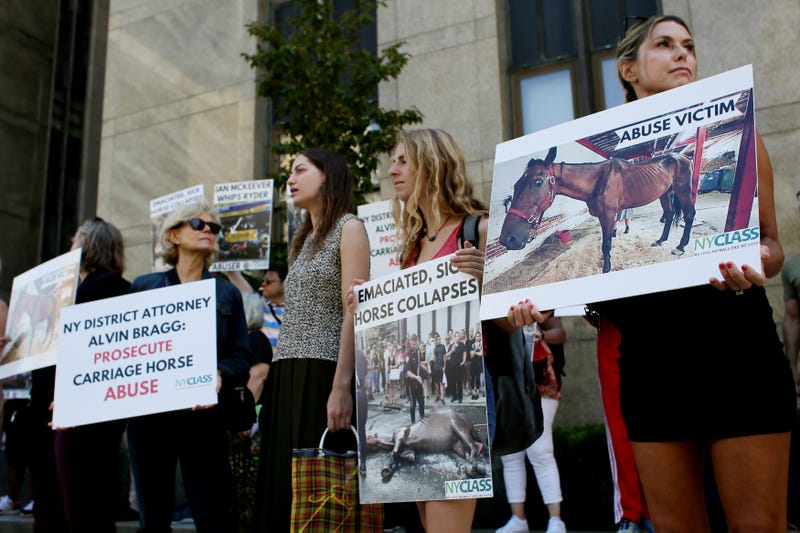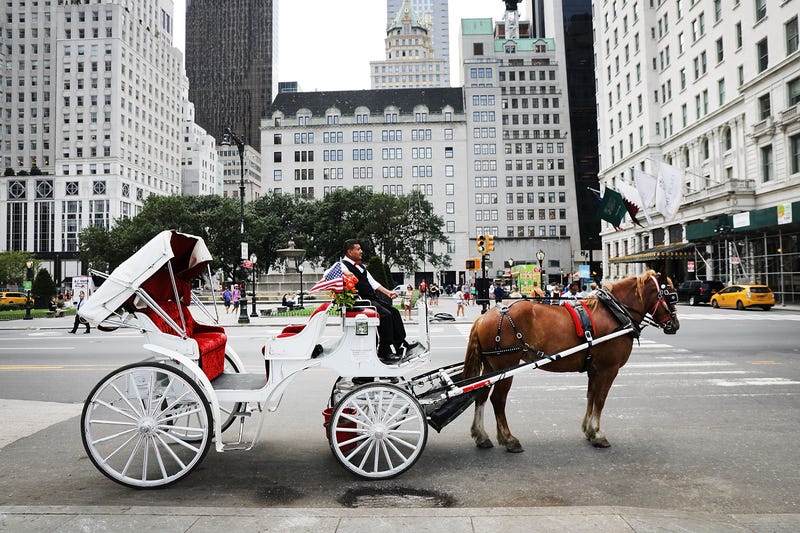
NEW YORK (1010 WINS/AP) — A carriage horse driver was acquitted Monday in the death of Ryder, the carriage horse who collapsed and died on a Manhattan street three years ago.
Ian McKeever, 56, had pleaded not guilty to a misdemeanor animal cruelty charge of overdriving, torturing and injuring animals and failure to provide proper sustenance. If convicted, he'd faced up to a year in jail.
In a statement after the verdict came down, Manhattan D.A. Alvin Bragg said, "All animals deserve to be treated with the utmost of care. I thank the jury for dedicating their time to hear the evidence presented to them over these past five days."
Prosecutors had accused McKeever of relentlessly driving Ryder on an 84-degree day in August 2022, despite signs that the animal was struggling to pull the carriage before he went down en route back to his barn.
“The defendant chose to press on, business as usual, and overwork Ryder," prosecutor Taylor Maurer told jurors in her opening statement. The horse survived the fall but was euthanized some months later because of health problems.
Transport Workers Union Local 100, the union that represents carriage horse drivers, said in a statement Monday that Ryder took only two trips the day he fell and that he had undiagnosed cancer.
"We will only accept humane care for all carriage horses, including proper medical care and treatment," said the statement attributed to Christina Hansen, a veteran carriage driver and TWU Local 100 shop steward.
"Since this incident, the union has made several important reforms and improvements, including ongoing talks with a nationally recognized horse veterinarian, immediate access to a horse hospital, and increased oversight," Hansen continued. "Carriage drivers like me enter this line of work because we love animals, want to spend all day with horses, and care deeply about them. Animal rights extremists have viciously vilified all carriage drivers, most of whom are immigrants or children of immigrants chasing their American dream. That needs to stop."

During the trial, the defense showed evidence that Ryder had only taken two trips the day he fell and that he was also suffering from cancer, a diagnosis that wasn't made until after the accident. The defense team also noted that Ryder had been fed every day and was not underfed.
The defense also said the driver wasn't whipping Ryder but was trying to get him up because horses shouldn't lie down for extended periods of time. The practice is recommended in the Health Department manual given to carriage horse drivers.
“Ryder’s fall is heartbreaking, but the evidence in this case is not going to show that Ryder fell because Ian overdrove him,” the lawyer, Raymond Loving, said in his opening statement.
Through questioning, Loving emphasized that the horse's temperature was normal and his breathing was not much faster than normal when Fontana took his vital signs. He did so after officers had started hosing down the animal.
Council Member Robert Holden, who sponsored legislation known as Ryder's Law that would outlaw the horse carriage industry in NYC, released a statement slamming the outcome of the criminal trial.
"This is a travesty of justice. Ian McKeever knew Ryder’s true age — the horse was nearly 30 years old, the equivalent of a 90-year-old human — and still chose to force him to work on the scorching streets of Manhattan," Holden said, adding, "This decision ignores the cruelty and inhumanity of what happened. I will not give up on ending this barbaric and outdated industry once and for all.”
Horse-drawn carriages have plied Central Park and the city's streets for over 150 years. Featured in countless movies and TV shows, they're a quaint attraction for many tourists and a cause célèbre for activists who have long wanted them banned.
Animal advocates say it's inhumane to have horses navigating Manhattan traffic. Over the years, some horses have gotten startled, run off and collided with cars or other objects. Others besides Ryder have collapsed on the job.
Supporters of horse-drawn carriages see the coaches as a romantic remnant of a bygone New York. They also note that the carriages net tourist dollars and have provided hundreds of jobs to drivers, plus jobs for a glut of farm and racing horses.
“If they did not come to New York City, most of these horses would be dead,” McKeever told The Associated Press in 2014. He said some of his own carriage horses were going to go to slaughterhouses before he bought them.
McKeever has been a carriage horse driver for 30 years. His attorney said Ryder belonged to the defendant's brother.
Ryder was outside for over seven hours on Aug. 10, 2022, mostly in Central Park. An onlooker, Caroline Londahl-Smidt, testified last Tuesday that the horse appeared to her to be in “major distress,” walking slowly up a hill, as McKeever shook the reins and seemed to be trying angrily to speed him up.
Later, the horse collapsed near Times Square during the evening rush hour. Bystander video published by the New York Post showed McKeever snapping the reins at him and telling him to get up.
Ryder rolled onto his right side and laid on the pavement for nearly an hour, occasionally trying to rise as police cooled him with water and ice from nearby restaurants, according to testimony and body camera video from Sgt. Vincent Fontana of the police department's mounted unit. Officers tucked a pillow under the horse's head to protect his right eye from the pavement.
Ultimately, the horse stood, walked into a trailer and was driven back to his stable.
The Associated Press contributed to this report.
